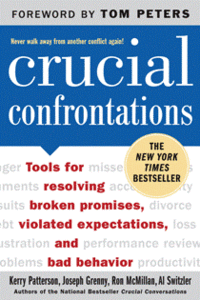- Crucial Confrontations
-
Crucial Confrontations: Tools for Resolving Broken Promises Violated Expectations and Bad Behavior 
Author(s) Kerry Patterson, Joseph Grenny, Ron McMillan, Al Switzler Country United States Language English Publisher McGraw-Hill Publication date 2005 Media type Print (Paperback) Pages 284 ISBN 0-07-144652-4 OCLC Number 56494086 Dewey Decimal 303.6/9 22 LC Classification HM1121 .C78 2005 Preceded by Crucial Conversations: Tools for Talking When Stakes are High Followed by Influencer: The Power to Change Anything Crucial Confrontations: Tools for Resolving Broken Promises, Violated Expectations, and Bad Behavior (ISBN 0-07-144652-4) is the second book by Kerry Patterson, Joseph Grenny, Ron McMillan, and Al Switzler. The book discusses the importance of accountability and provides applicable skills for dealing with violated expectations. It was published by McGraw-Hill in 2004 and has since become a New York Times bestseller.[1]
Contents
Overview
The authors define crucial confrontations as “face-to-face accountability discussion[s].” [2] They assert that the majority of problems within families, teams or organizations stem from people’s inability to hold crucial confrontations. Even when others break promises, violate rules, or miss deadliness, the majority of people fear the repercussions of holding them accountable through a crucial confrontation. [3]
The authors attribute this fear to several factors including power differentials, politics, past experience, and most commonly, a lack of skill to speak up effectively – often, people simply don’t know what to say or how to say it. Consequently, bad behavior remains unchecked and teams, organizations and families endure devastating and costly repercussions. [2]
To support this claim, the authors reference new research that shows that the disappointments and bad behaviors of others sap organizational performance by 25 to 50 percent [4] and account for 90 percent of divorces. [5]
Based on a premise outlined in their prior book that we are poorly equipped to handle high-stakes dialogue, the authors provide principles and skills for holding effective crucial confrontations. [6] They claim that crucial confrontations don’t have to be uncomfortable, awkward, or explosive; rather, when handled effectively, crucial confrontations can strengthen relationships and improve vital organizational outcomes such as quality, productivity and morale. [7]
Key Points
The fundamental skills outlined in the book are:
Work on Me First:
• Choose What and If – Every crucial confrontation should start with two questions: “What?” and “If?” When asking yourself “What,” consider what stage of the problem the infraction is in – is it the first time this has happened, is it a repeat mistake, or is it a pattern of bad behavior? [8] When asking yourself “If,” determine if you’re being unreasonable or if you’re telling yourself a story that isn’t quite true. Considering these options will keep you from speaking up badly. [9]
• Master My Stories – Master emotions such as anger, fear or pain by learning to first work on your own thoughts or feelings. It is always a mistake to enter a crucial confrontation half-informed and half-cocked as a result of the story you are telling yourself about the other person. [10]Confront With Safety
• Describe The Gap – To create an environment of safety in your crucial confrontation, your first step is to simply describe the gap between what actually happened and what you expected to happen. From there, listen carefully to see if the problem is due to a motivation issue, an ability issue, or both. [11]
• Make It Motivating – Motivation has little to do with the amount of power, clout or charisma a person has. It is also not something you do to someone. Rather, people are motivated by the consequences they anticipate. Motivation is about expectations, information and communication. Motivating others occurs when you change their view of the consequences of a problem. [12]
• Make It Easy – A leader is responsible for removing noxious or unpleasant barriers and making the job easier for others to accomplish. [13]
• Stay Focused and Flexible – Don’t deter from the problem you have come to confront, in other words, the problem you outlined when you asked yourself “what is the real issue?” If the other person becomes fearful, step out of the original problem, restore safety and return to the place you left off. If another problem emerges, step out of the original problem, ask yourself “What” and “If,” deal with it if needed, and then once again return to the place you left off. [14]
Move to Action
• Agree on a Plan and Follow Up – At the conclusion of your confrontation, agree on a plan, as well as the follow-up method, and then actually follow-up. A complete and clear follow-up plan includes four elements: who, does what, by when, follow-up. [15]See also
External links
References
- ^ New York Times (2004), http://www.amazon.com/Crucial-Confrontations-Kerry-Patterson/dp/0071446524
- ^ a b Patterson et al., p. 21
- ^ Patterson et al., p. 11
- ^ Patterson et al., p. 16
- ^ Patterson et al., p. 19
- ^ Patterson et al., p. 213
- ^ Patterson et al., p. 11-12, 15
- ^ Patterson et al., p. 26
- ^ Patterson et al., p. 38
- ^ Patterson et al., p. 79-80
- ^ Patterson et al., p. 110-111
- ^ Patterson et al., p. 143-144
- ^ Patterson et al., p. 169-170
- ^ Patterson et al., p. 196-197
- ^ Patterson et al., p. 215-216
Categories:- 2002 books
- Business books
Wikimedia Foundation. 2010.
